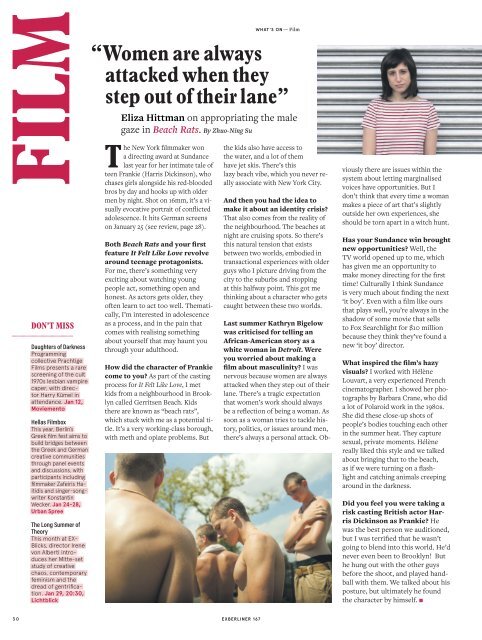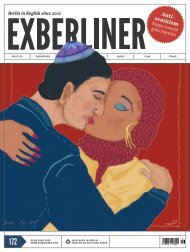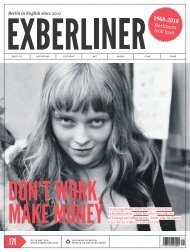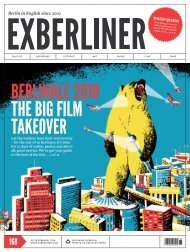Exberliner Issue 167, January 2018
You also want an ePaper? Increase the reach of your titles
YUMPU automatically turns print PDFs into web optimized ePapers that Google loves.
WHAT’S ON — Film<br />
“ Women are always<br />
attacked when they<br />
step out of their lane”<br />
Eliza Hittman on appropriating the male<br />
gaze in Beach Rats. By Zhuo-Ning Su<br />
DON’T MISS<br />
Daughters of Darkness<br />
Programming<br />
collective Prachtige<br />
Films presents a rare<br />
screening of the cult<br />
1970s lesbian vampire<br />
caper, with director<br />
Harry Kümel in<br />
attendance. Jan 12,<br />
Moviemento<br />
Hellas Filmbox<br />
This year, Berlin’s<br />
Greek film fest aims to<br />
build bridges between<br />
the Greek and German<br />
creative communities<br />
through panel events<br />
and discussions, with<br />
participants including<br />
filmmaker Zafeiris Haitidis<br />
and singer-songwriter<br />
Konstantin<br />
Wecker. Jan 24-28,<br />
Urban Spree<br />
The Long Summer of<br />
Theory<br />
This month at EX-<br />
Blicks, director Irene<br />
von Alberti introduces<br />
her Mitte-set<br />
study of creative<br />
chaos, contemporary<br />
feminism and the<br />
dread of gentrification.<br />
Jan 29, 20:30,<br />
Lichtblick<br />
The New York filmmaker won<br />
a directing award at Sundance<br />
last year for her intimate tale of<br />
teen Frankie (Harris Dickinson), who<br />
chases girls alongside his red-blooded<br />
bros by day and hooks up with older<br />
men by night. Shot on 16mm, it’s a visually<br />
evocative portrait of conflicted<br />
adolescence. It hits German screens<br />
on <strong>January</strong> 25 (see review, page 28).<br />
Both Beach Rats and your first<br />
feature It Felt Like Love revolve<br />
around teenage protagonists.<br />
For me, there’s something very<br />
exciting about watching young<br />
people act, something open and<br />
honest. As actors gets older, they<br />
often learn to act too well. Thematically,<br />
I’m interested in adolescence<br />
as a process, and in the pain that<br />
comes with realising something<br />
about yourself that may haunt you<br />
through your adulthood.<br />
How did the character of Frankie<br />
come to you? As part of the casting<br />
process for It Felt Like Love, I met<br />
kids from a neighbourhood in Brooklyn<br />
called Gerritsen Beach. Kids<br />
there are known as “beach rats”,<br />
which stuck with me as a potential title.<br />
It’s a very working-class borough,<br />
with meth and opiate problems. But<br />
the kids also have access to<br />
the water, and a lot of them<br />
have jet skis. There’s this<br />
lazy beach vibe, which you never really<br />
associate with New York City.<br />
And then you had the idea to<br />
make it about an identity crisis?<br />
That also comes from the reality of<br />
the neighbourhood. The beaches at<br />
night are cruising spots. So there’s<br />
this natural tension that exists<br />
between two worlds, embodied in<br />
transactional experiences with older<br />
guys who I picture driving from the<br />
city to the suburbs and stopping<br />
at this halfway point. This got me<br />
thinking about a character who gets<br />
caught between these two worlds.<br />
Last summer Kathryn Bigelow<br />
was criticised for telling an<br />
African-American story as a<br />
white woman in Detroit. Were<br />
you worried about making a<br />
film about masculinity? I was<br />
nervous because women are always<br />
attacked when they step out of their<br />
lane. There’s a tragic expectation<br />
that women’s work should always<br />
be a reflection of being a woman. As<br />
soon as a woman tries to tackle history,<br />
politics, or issues around men,<br />
there’s always a personal attack. Obviously<br />
there are issues within the<br />
system about letting marginalised<br />
voices have opportunities. But I<br />
don’t think that every time a woman<br />
makes a piece of art that’s slightly<br />
outside her own experiences, she<br />
should be torn apart in a witch hunt.<br />
Has your Sundance win brought<br />
new opportunities? Well, the<br />
TV world opened up to me, which<br />
has given me an opportunity to<br />
make money directing for the first<br />
time! Culturally I think Sundance<br />
is very much about finding the next<br />
‘it boy’. Even with a film like ours<br />
that plays well, you’re always in the<br />
shadow of some movie that sells<br />
to Fox Searchlight for $10 million<br />
because they think they’ve found a<br />
new ‘it boy’ director.<br />
What inspired the film’s hazy<br />
visuals? I worked with Hélène<br />
Louvart, a very experienced French<br />
cinematographer. I showed her photographs<br />
by Barbara Crane, who did<br />
a lot of Polaroid work in the 1980s.<br />
She did these close-up shots of<br />
people’s bodies touching each other<br />
in the summer heat. They capture<br />
sexual, private moments. Hélène<br />
really liked this style and we talked<br />
about bringing that to the beach,<br />
as if we were turning on a flashlight<br />
and catching animals creeping<br />
around in the darkness.<br />
Did you feel you were taking a<br />
risk casting British actor Harris<br />
Dickinson as Frankie? He<br />
was the best person we auditioned,<br />
but I was terrified that he wasn’t<br />
going to blend into this world. He’d<br />
never even been to Brooklyn! But<br />
he hung out with the other guys<br />
before the shoot, and played handball<br />
with them. We talked about his<br />
posture, but ultimately he found<br />
the character by himself. n<br />
30<br />
EXBERLINER <strong>167</strong>


















